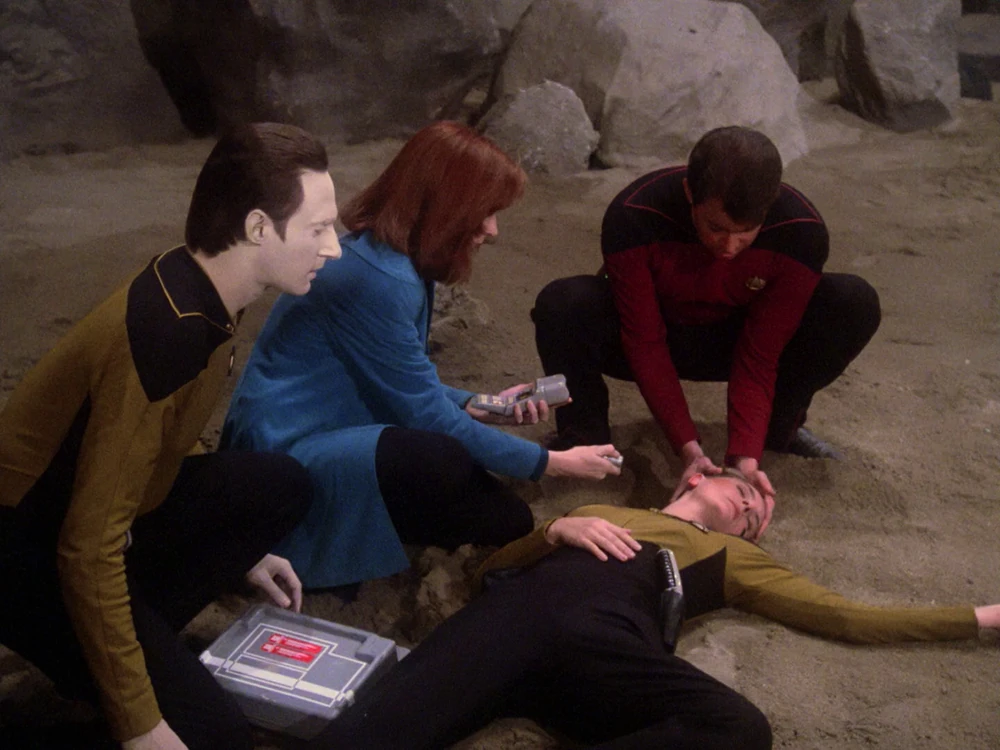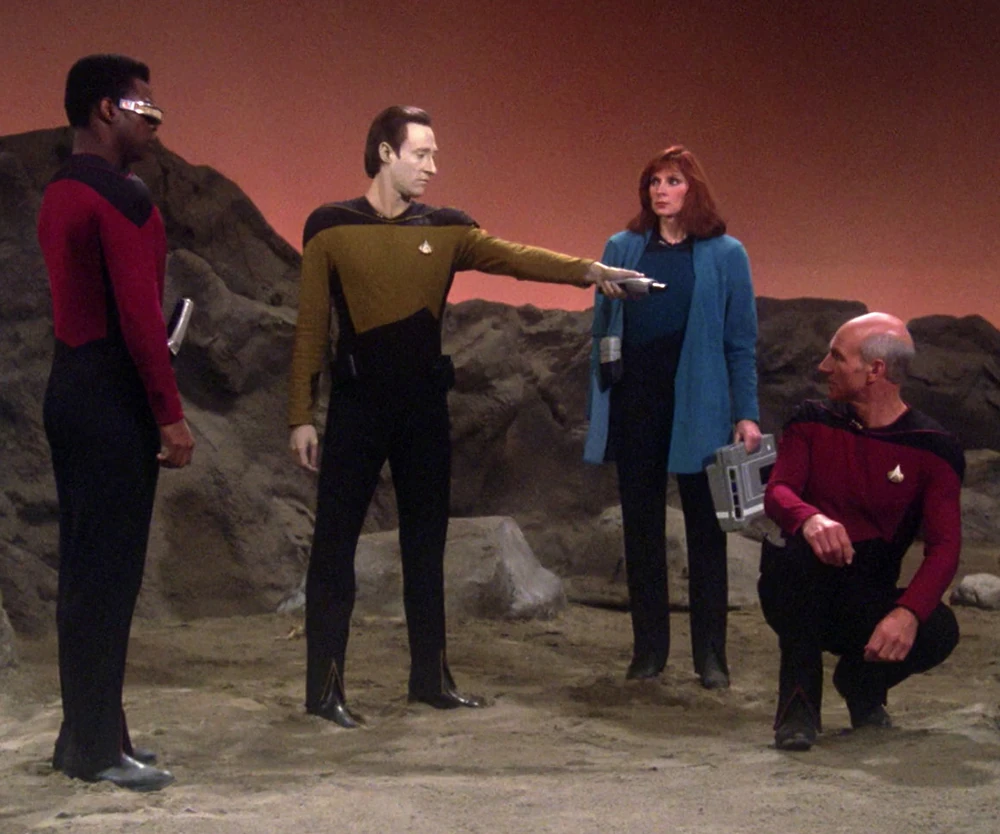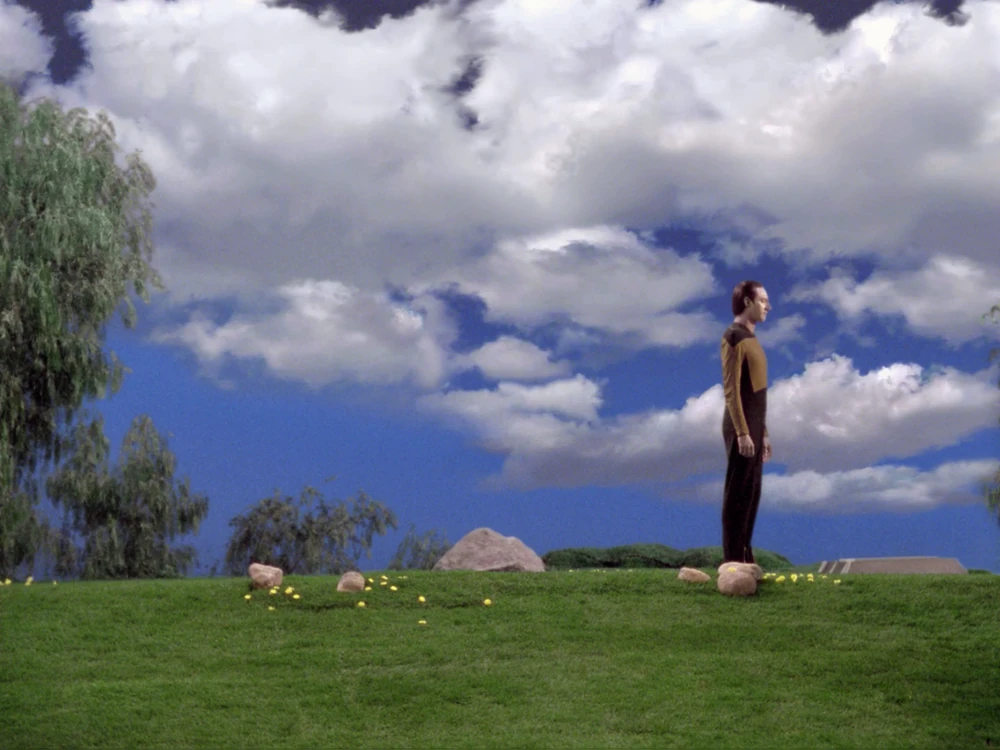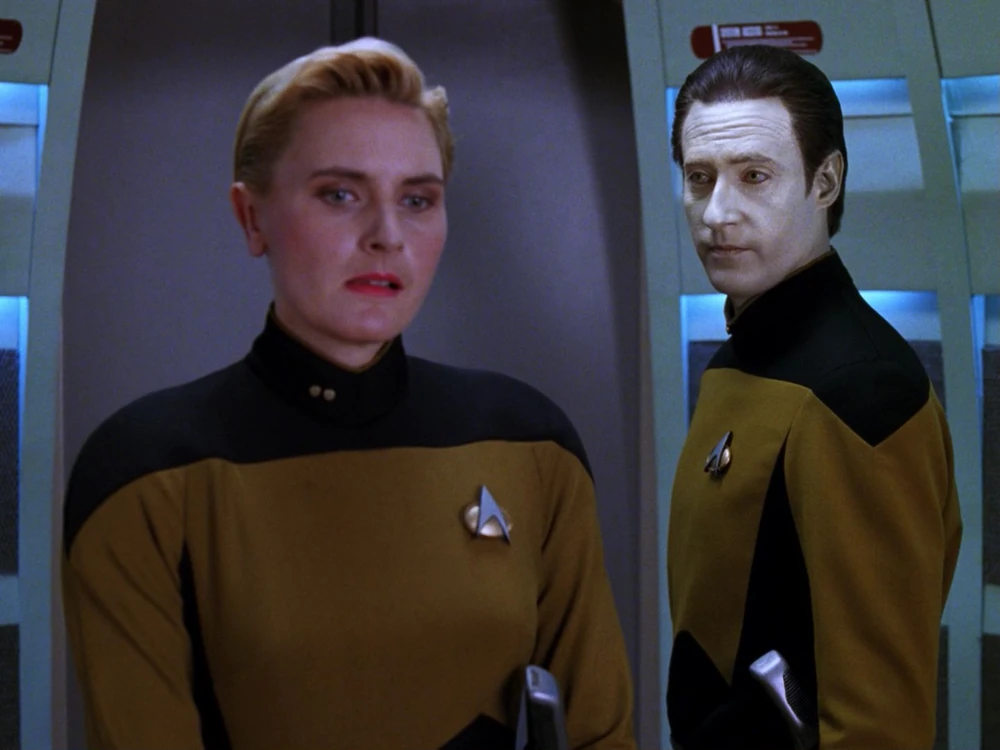The first season of The Next Generation is generally considered one of the weakest in the series, leading many fans to recommend skipping it altogether. Among its missteps, one moment is often singled out: the abrupt and seemingly meaningless death of Tasha Yar.
Many argue it was an unceremonious and disappointing way to kill off a main character. But was it really a mistake?
Personally, I’ve always seen it differently. Skin of Evil delivers a rare kind of television death for its time. It was a sudden, senseless, and cruel death, much like it would be in real life. It left a lasting impression on me because it felt real. Far from being a failure, Tasha’s death was one of Star Trek’s boldest moments, shaping the series in ways that would only become clear over time.
Red Shirted
Skin of Evil opens with the Enterprise on its way to pick up Deanna Troi, who has been away at a conference. They are to meet with the shuttlecraft taking her to the rendezvous, but the warp engines are undergoing maintenance so the ship can only travel using impulse engines.
Tragedy hits when Deanna’s pilot loses control of the shuttle and they start hurtling toward a nearby planet. Captain Picard orders the Chief Engineer to get the warp engines back online as soon as possible so they can mount a rescue. The Chief Engineer cuts as many corners as he can, overriding several safety protocols to get the warp engines ready for warp.
When they reach the planet, Commander Riker leads an away team consisting of himself, the android Data, Chief of Security Tasha Yar, and Doctor Crusher. They try to reach the shuttle but are blocked by a large pool of black viscous liquid that moves around to block their path.
They discuss it for a while and theorise it may be intelligent, and also hostile. A black, oozing humanoid figure rises out of the pool and tells them they may not pass. When Tasha Yar tells the creature that they must save their crewmen, the beast lashes out and sends her over the rocky terrain. By the time Doctor Crusher reaches her she’s already dead.

I have vivid memories of this moment. I was young when this came out, so it was a shock to me that they would actually kill off a main character like this. They didn’t have shows like Game of Thrones in the 90s. It wasn’t normal for major characters to die every other episode in a TV series.
I watched as the away team were beamed back to the ship and they rushed straight to sick bay. Crusher started work, doing everything she could to get Tasha back. She reaches a point of desperation, to the point that the nurse all but questions her orders. Eventually the Doctor is forced to face the truth: Tasha’s brain has shut down. She is dead and she is not coming back.
In the next scene Picard tells the crew that he understands they wish to mourn, but they still have to rescue Deanna and the pilot. He tells them to keep their emotions in check and focus on the mission for now. There will be time for mourning later.
This might seem cold to some, but it is right. Starfleet are trained for situations like this, and are expected to perform their duties even after losing someone this way. But they also aren’t heartless, Picard is telling them that he understands their loss, and that they will take the time to mourn when they can.
Battle with Armus
With the mission still ongoing, the crew faces the entity with a new sense of caution. They’ve already lost one of their own, and they can’t afford another mistake. The entity, known as Armus, attempts to inflict suffering in varying forms to them. They learn that it is simply bored, and is using them for its own entertainment.
The crew are at their best in this episode. One of the problems with season 1 is many of the characters don’t have clearly defined roles yet, but here in this episode we see each of them fall into the roles they were destined for. We’ve already seen Crusher, the doctor, desperately trying to save a life. We have also seen Riker leading the away team.
After Tasha’s death, Worf becomes acting Chief of Security, a role he will take on full time later in the series. Troi, trapped within the shuttle, engages in a psychic battle with Armus, using counselling techniques to combat his attempts at mental torture. The emotionless Data resists Armus’ attempts to inspire fear with his cold, logical rebuttals. LaForge is the exception to this rule, as his role isn’t clearly defined until season 2.

Wesley Crusher is absent from this episode. I don’t hate the character, and I don’t want to throw any shade on the great Wil Wheaton, but the writers of early TNG clearly had no idea how to write children. Every time children show up in season 1 they feel like they were written by someone who has never met a child. The only exception being Coming of Age, where Wesley and the other children are actually well-written.
In the final act of the episode Picard decides to take charge and beam down to the planet to face Armus himself. Here we see Picard do what he will be remembered for by future fans: he uses his skills in diplomacy and negotiation to talk Armus down and create a window for the Enterprise to rescue Deanna and her pilot.
Armus begs Picard to take him with them, but after the cruel torture he has inflicted on the crew the captain refuses. Armus is cursed to spend the rest of his days on the planet, once again abandoned as he was however many years ago.
Coda
At the end of the episode we see Tasha’s funeral on the holodeck. Surrounded by grass with blue skies above, a hologram of Tasha Yar is activated. It is a recording she made to say goodbye to the crew in the case of her death. She talks about every member of the crew one by one, and why they were important to her.
As everyone is leaving, Data is left confused. He pulls Captain Picard aside to ask him about the funeral. And, in my opinion, this is perhaps one of the most emotional and well-written conversations in season one of TNG:
Data: Sir, the purpose of this gathering confuses me.
Picard: Oh? How so?
Data: My thoughts are not for Tasha, but for myself. I keep thinking, how empty it will be without her presence. Did I miss the point?
Picard: No you didn’t, Data. You got it.
This hits hard. In but a few words Picard is able to explain the real purpose of a funeral to Data. That it is not for the dead, but for the living. To remember. To gain closure. To be able to move on.

But for someone like me it also hits on another aspect of life. Being autistic you can often find yourself in social situations where you don’t understand what you are supposed to do. I would do things like this all the time when I was younger. Still do, in fact.
I remember trying to figure out when I was supposed to wear sunglasses and when I was supposed to take them off. It took me a while to understand that the sunglasses aren’t about how other people see me, but about my own comfort.
Data is the same in this way. He’s not autistic, of course. But as an android he often has similar issues understanding how human interaction works. This leads to many misunderstandings both funny and poignant. This question about the funeral is exactly the kind of thing I would have asked in the past. I was always worried about how I should behave at funerals. It took me a while to realise I was supposed to think about my life, and how I would miss their presence.
Legacy
Many hate the pointlessness of Tasha Yar’s death, the way it occurs at the beginning of the episode, and how the crew moves on quickly. I’m unfortunate enough to have lost people to violence, and anyone else who has knows that it is sudden. One second they are there and then suddenly they are not.
Tasha Yar’s death reflects that reality. I think many people hate it because they wanted to see where her character went. But in retrospect, it showed the writers weren’t afraid to take risks. The impact of her death weaves throughout the series and we see how it affects the crew in later episodes.
In Measure of a Man, one of the best episodes of Star Trek ever made, we see that Data keeps a hologram of Tasha. Because, as he explains, she was special to him. It shows he has a semblance of humanity when Picard is arguing for his right to life.

In Yesterday’s Enterprise, the crew are shifted to an alternate timeline where they never made peace with the Klingons. During this war they never went to Armus’ planet, so Tasha Yar was never killed. We get to see how she would have evolved as a character, and that she is willing to sacrifice herself if it means saving lives. Knowing she died in the real timeline, she goes back in time to help the Enterprise C prevent the ongoing war. She does this knowing that the Enterprise C doesn’t survive and that she will die on that ship as well.
The first part of Best of Both Worlds ends with Picard assimilated as “Locutus of Borg”. Riker is forced to make a decision: let the Borg cube survive so there is a chance to save his Captain, or destroy the cube and save millions of lives. For a seasoned Starfleet officer he barely hesitates when he gives the order to fire. The episode ends and we had to wait a year to find out if Picard would survive.
In a way, Tasha Yar’s death was exactly what Star Trek needed: a stark reminder that space is dangerous, life is fragile, and no character is ever truly safe. Was it a mistake? Maybe. But it was a moment that shaped Star Trek forever.



